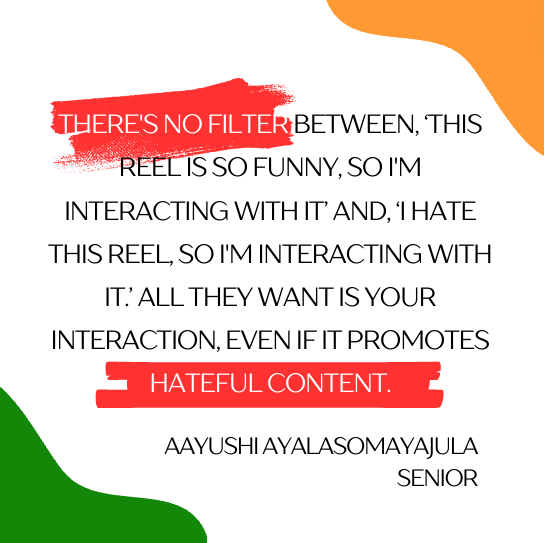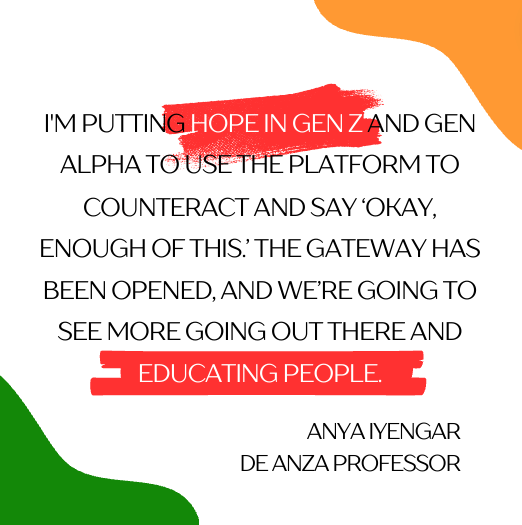While scrolling through Instagram, De Anza professor Anya Iyengar’s son came across a harmless video of chefs making pizza. However, when her son showed her the comments section, she was hit by unrelated and racist comments directed toward the Indian community. She was frustrated and confused, specifically, recalling a user commenting, “Oh good you washed your hands, Indian people don’t do that.”
Iyengar has noticed a rise in the frequency of derogatory content towards the Indian community shown on her Instagram and TikTok, especially after the COVID-19 pandemic. Having grown up in the Midwest in the 90s, Iyengar is no stranger to receiving hurtful comments about her Indian heritage but feels the apps have exacerbated the amount of offensive content. Senior Aayushi Ayalasomayajula downloaded the popular social media app TikTok four months ago and shares that she has also come across racially directed and harmful content about the Indian community, despite never interacting with any of them. Ayalasomayajula feels the freedom users have on social media is unchecked and not held within reason.
“Social media has caused, not just Indian people, but any ethnicity to be victims of discrimination,” Ayalasomayajula said. “More and more people jump on the hating bandwagon, and it fuels their algorithms. It seems like algorithms send out even more racist reels after people comment on, send or like just one. There’s no filter between, ‘Oh my God, this reel is so funny, so I’m interacting with it’ and, ‘Oh, I hate this reel, so I’m interacting with it.’ All they want is your interaction, even if it promotes hateful content.”

Junior Edison Chang says racist content toward Indians usually targets two topics: hygiene and food. He feels the most viral videos that circulate are of unhygienic street food vendors in India, and as a result, triggers generalized comments about Indian people. While Iyengar admits there is truth to some street food vendors following unsafe practices, recalling her own instances of getting food poisoning, she finds it dangerous when general assumptions are made about all Indian street food vendors or restaurants.
“There’s an expression saying that half-knowledge is a very dangerous thing, and what’s being shown here is half-knowledge,” Iyengar said. “People might have seen one Indian person not wash their hands when they’re cooking, and suddenly it’s a stereotype. Then someone who has no idea will read this and make a judgment based on an incorrect judgment.”
Ayalasomayajula agrees, expressing her frustrations with younger and more impressionable children having access to social media, especially with social media platforms not enforcing strict punishments for users that bypass the age requirement. Despite Chang noticing that TikTok has better moderation and offensive content is taken down faster than Instagram Reels, he feels that without streamlined rules enforced to remove the content, young users won’t understand the implications of taking offensive content lightly. He believes racially targeted content has become a trend for younger users, specifically Generation Alpha, to interact with.
“People naturally want to blend in with others and cater toward what the majority thinks, especially the younger generation,” Chang said. “If you look in the comments, it’s mostly hate comments or people trying to be funny. The negative parts are displayed on social media, so naturally, people just want to join in on the joke rather than logically thinking about it.”
From her own experiences, Ayalasomayjula has seen her younger sister’s friends send her Instagram reels that mock Indian food and point out her body hair as a joke. She states she has never been affected by this content, due to her being confident in her culture, but recognizes that younger children with access to social media may not have this clarity yet.
“As an older sister, I try to talk to her and tell her that we can do what makes you feel comfortable, what makes you feel safe in your own skin,” Ayalasomayajula said. “But you have to understand that it’s completely normal and human to have these features and this culture. The sooner you accept it’s a part of you, and the less you try to hide it and push away, the more confident you’ll feel, even though it might not seem that way right now.”
Ayalasomayajula encourages members of the Indian community to be proud of their culture and expresses her wish for social media to showcase the positive aspects of India more often. Iyengar agrees, sharing her experiences at Indian restaurants, where the service is friendly and warm, much like the food. She has also noticed specific trends and ideas originated from Indian culture do not get the credit, and have whitewashed labels. Specifically, Iyengar notes the “golden milk” trend which is based on the Indian cultural staple haldi doodh.
“I always mention to my son how rich and how ancient our culture is, and how much pride he should take in the fact that it’s thousands and thousands of years old,” Iyengar said. “There’s so many things that are rooted in our culture being adopted into Western society. I’m not negating any of these trends, but give credit where it’s due. Look at how many people talk about karma on a regular basis. Karma is a mainstay of the Indian religion. Taylor Swift sings about it, but I want people to know it’s from a very deep-rooted philosophy.”
Iyengar brings up a potential benefit for younger people on social media, noting a rise in young influencers of Indian origin, with few among millennials, a surge in Generation Z, and even more expected in Generation Alpha. She believes these influencers, especially from later generations, will move past social media’s current offensive state.

“For every action, there’s an equal and opposite reaction, like Isaac Newton said,” Iyengar said. “I think that all this vitriol against Indian culture is going to eventually come back in a positive way. I’m really putting a lot of hope in Generation Z and Generation Alpha to use the platform to counteract and say ‘Okay, enough of this.’ The gateway has been opened, and we’re going to see more of these people going out there and completely demolishing all these stereotypes and educating people.”
This story was originally published on El Estoque on September 20, 2024.




































